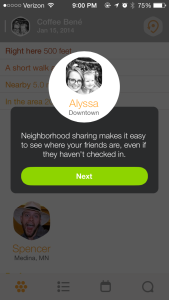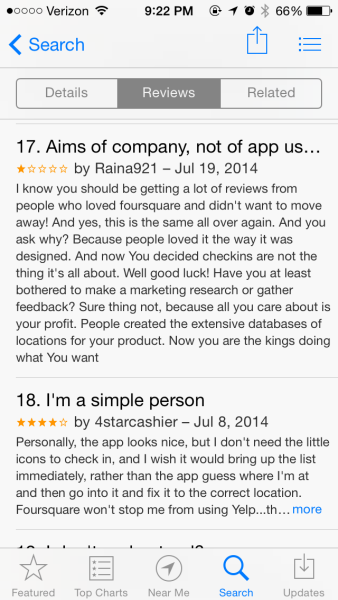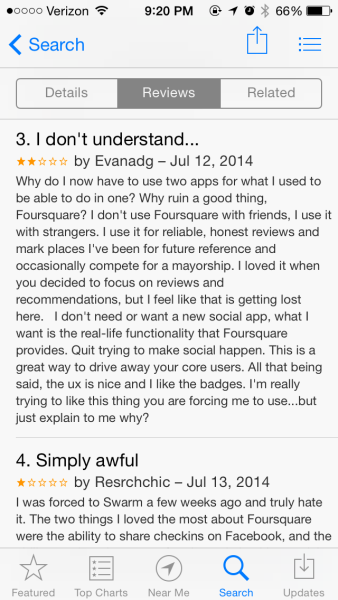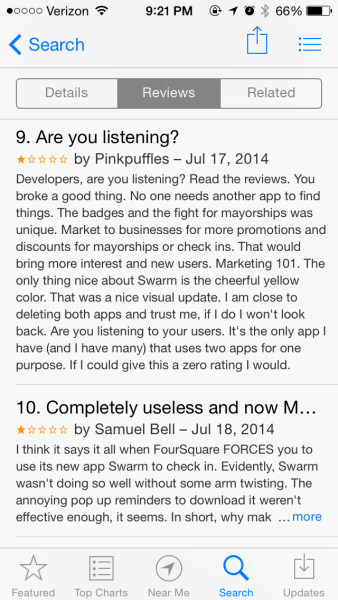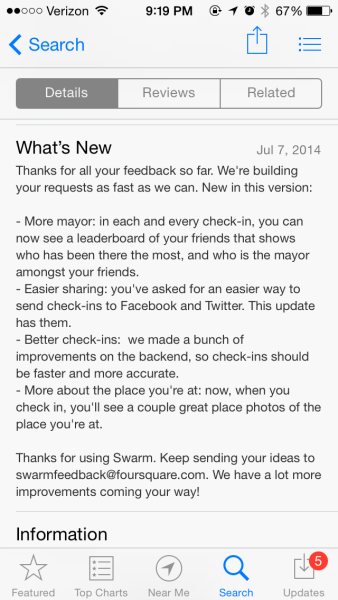I’ve never been big into Foursquare. I tried it out for a bit last summer, but when my scheduled picked up in the fall, the app quickly made its way into the dusty crevice of the third page of my iPhone. I just didn’t have time for it.
But I’m intrigued once again, given the buzzin’, or rather swarmin’, around Foursquare’s recent big move.
On May 15th, Foursquare released Swarm, an app that takes its check-ins and mixes in some social planning. This “unbundling” of sorts includes a revamp of Foursquare’s original app, which promises to boost its search capabilities with its forthcoming update.
Apps Get Focused
The move echoes a larger shift in mobile app development towards specific task-based apps. In a killer article for TechCrunch, Matthew Panzarino briefly outlines the three phases of app development:
1. “Information Appliance” Model: based less on connected experiences, early app offerings were designed to perform an electronic function, such as a calculator or a camera.
2. “Home Screen” Era: for quite awhile now, it was believed that apps stood no chance unless they held a spot on your home screen; the only way to turn a profit was to keep the consumer in your app as often and for as long as possible.
3. “Apps as “Service Layers:” now, an app’s presence on your home screen isn’t as telling of success as it once was. According to Panzarino, “these are the apps you have on your phone but only open when you know they explicitly have something to say to you,” i.e. they aren’t and don’t try to be an all-encompassing experience. These apps aren’t for browsing or discovering; these are apps with a specific, focused purpose and, as Panzarino explains, are “informed by contextual signals like hardware sensors, location, history of use and predictive computation.”
Jon Steinback, Foursquare’s VP of product experience, hones in on this “fundamental shift” in mobile app use:
“We were born in mobile but we were born in this idea that each mobile app was kind of like a web property bundled up for mobile … And as mobile usage has broadened and evolved you get individual experiences instead. You open an app to do a specific task and not as a gateway to a large complicated experience.”
That’s what Foursquare was: “a gateway to a large complicated experience.” I could use it to check-in to restaurants, work, the gym, bars, etc. I could see where my friends were, what they were up to and with whom. I could snag some deals from local businesses. But I didn’t want to do all of these things when I opened the app.
Frankly, I didn’t care what my friends were doing or where they were, because I had Facebook and Twitter for that (especially considering Facebook’s new “Nearby Friends” feature). I wanted happy hour deals or ideas on where to hunker down and study for my exams.
In short, I wanted search without the social rather than a bundled, hybrid social experience.
Swarm is a refined approach to social planning, while the forthcoming updated Foursquare appears to promise some kick-ass local search, taking on Yelp and Google in a big way.
And the People Cried Unto Foursquare
The tech world is abuzz with interest and excitement about Foursquare’s move, but the app’s loyal users? Not so much. In fact, their critiques are quite harsh, offering mostly one star in the iTunes App Store and the Google Play store. Raina921 loved the check-ins and design of the previous Foursquare:
Evanadg doesn’t want social; he wants “reliable, honest reviews” and the ability to mark places he’s been for “future reference:”
Pinkpuffles claims it’s the only app “that uses two apps for one purpose:”
Quite a lot of this negative feedback populates the review pages. Most people loved Foursquare the way it was. They loved the check-ins and vehemently pursued mayorships and deals from their local vendors.
Foursquare IS listening to this dedicated audience, however. A new update came July 7th with this note from the company:
My guess is, however, that the unbundling wasn’t aimed at this dedicated user base. Rather, this move was meant to get the social check-in features off of the main Foursqaure app in order to prepare the platform for some killer search options, including anticipatory search and contextually based recommendations.
The rationale is that this local search capability will appeal to a wider user-base, as confirmed by Bijan Sabet, one of Foursquare’s early investors and a current board member: “Just like you don’t need to tweet to enjoy Twitter, splitting the app in two will help make it clear to a big audience that you don’t need to check in to find value in Foursquare.”
Looking Forward
Foursquare’s unbundling signals a shift in app development from large, do-it-all apps to refined, focused components, which is great news for all of us that are burnt out by our constant, plugged-in social life.
I’m learning that there’s only a very small part of the population that can not only handle but also enjoy being plugged into social 24/7. Check-ins cater to this niche audience. Most of us, however, are too busy or tied up to drop what we’re doing and go grab a drink with the friend that Swarm tells us is just two blocks away from us.
Most of us are exhausted. We don’t need another social app. We don’t need another opportunity to compare ourselves to others.
What we like and need, however, is ease and utility. And that’s what this updated Foursquare app will hopefully deliver with some pretty stellar, no-fluff local search deals and recommendations.
Because most of us just need to find the best happy hour in town, and if we see our friends there – cool. If not, cheers to drinking for one.
